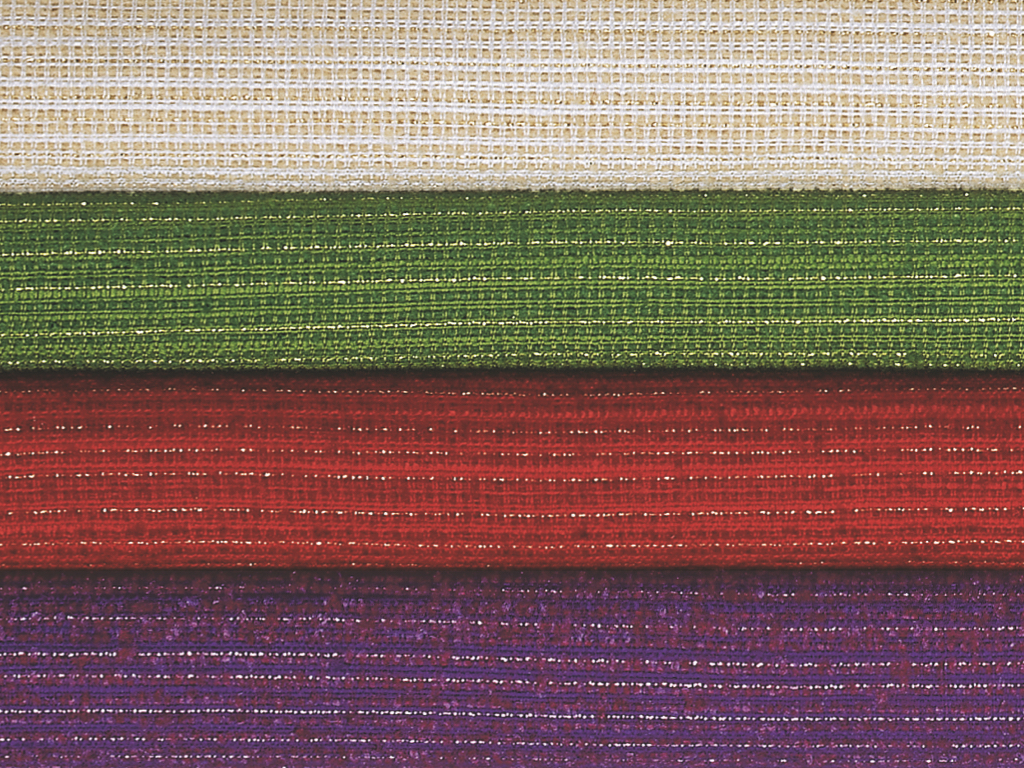Pascal
Viscose is a type of textile made from the cellulose fibres that are contained in wood pulp; like beech, pine and eucalyptus but also bamboo. It has a silk-like appearance and the ability to absorb and retain rich and vibrant colours. Its cellulosic base gives it properties similar to those of cotton and smoothness similar to silk, meaning it’s moisture absorbent, breathable and comfortable to wear. Viscose is semi-synthetic due to the chemicals involved in the viscose process. Dupion is a blend of 70 man-made fibre and 30% viscose, guaranteeing the advantages of a man made fibre, but keeping the soft feel of viscose.
Pascal is a heavier fabric, perfect for stole, tapestries, banners, altar- and lectern covers.
Washing instructions :
If you do opt to wash this viscose and man-made fibre blend, always hand wash in cold water to avoid any dye bleeds. Use a mild detergent and gently work it into the fabric. Do not wring or squeeze the item so as not to stretch it. Rinse and shake out the water and hang it or lay it flat to dry.
Dry cleaning also is possible, but do mention that this requires a special viscose program.
Viscose fibers become weakened and tend to break down when they are wet. While the polyester content in the blend is rugged enough to wash in the washing machine on a regular cycle, the viscose fibers, which consist of cellulose derived from plant cells, are not as durable. So vestments made of a polyester and viscose mix must never be dried in a dryer or spun or wrung to dry. They should be hung up on a clothesline or laid flat to dry when they are still soaking wet after hand washing. The viscose content retains water, so it is likely to take a while to dry thoroughly.
Vestments made in Pascal can be taken to the dry cleaner, but clearly mention that they are a man-made fibre and viscose mix and to require special attention.
Storing vestments
Keeping vestments clean and dry in storage is the most effective protection. In addition to this make sure that they are 100 percent dirt free before packing. Not only cloths but closets, trunks clean, and dresser drawers should also be clean. Please use a matching garment cover for protection.
Techniques
We offer several techniques that can be used to decorate the paraments. A technique also requires a specific washing instructions.
Please keep following in mind for maintance :
- Hand embroidery : hand wash only with lukewarm water, no bleach. Only very mild detergent. Parament can not be machine washed or taken to dry cleaner. Before washing any vintage or antique pieces, check the fiber content and test the fibers to see if they can withstand washing. Some fibers can't be washed in soap and water, and older pieces might not be sturdy enough. To test a piece, crinkle it gently in your hands while holding it up to your ear. On older pieces, you might hear a gentle crinkling noise as you handle the fabric, which indicates that fibers are breaking. Do not wash a piece that crinkles because this will cause further damage and the piece could disintegrate in the wash.
Newly completed embroidered projects in good condition that have been worked in cotton embroidery thread often need just minimal cleaning, or just need to be vacuumed using a clean piece of nylon cover placed over the vacuum hose (worn-out pantyhose and knee-high stockings are perfect for this). Heavily soiled items might need a mild bath. Hand embroidery that need a thorough cleaning can be freshened easily in room-temperature water with a mild soap like Orvus paste or sodium borate (aka borax) dissolved in water with a ratio of 1 teaspoon per gallon. Allow the piece to soak for 15 to 20 minutes to loosen and release dirt and accumulated debris. Rinse thoroughly after soaking at least twice with clean, room-temperature water.
- Machine embroidery : is machine washable or can be taken to a dry cleaner. However, the maintenance instructions of the fabric needs to be followed first. A machine embroidery on a vestment in Pascal f.ex. does require the washing instructions for Pascal.
- Application technique : give to a reliable dry cleaner only, can not be machine washed. Please always clearly ask that the parament is correctly cleaned according to the composition of the fabric.
- Digital printing : is machine washable or can be taken to a dry cleaner. However, the maintenance instructions of the fabric needs to be followed first. A digital printed symbol on a vestment in Pascal f.ex. does require the washing instructions for Pascal.

